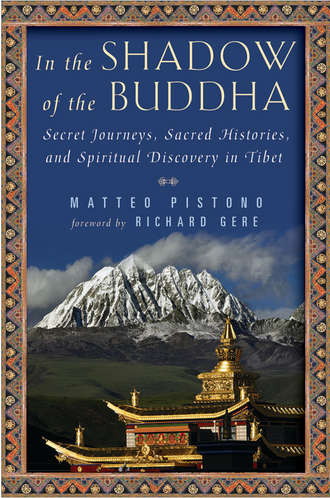Secret Journeys, Sacred Histories, & Spiritual Discovery in Modern-Day Tibet
 Intrigue, adventure, and a profound spiritual odyssey await you in In the Shadow of the Buddha, Secret Journeys, Sacred Histories, and Spiritual Discovery in Tibet by Matteo Pistono.
Intrigue, adventure, and a profound spiritual odyssey await you in In the Shadow of the Buddha, Secret Journeys, Sacred Histories, and Spiritual Discovery in Tibet by Matteo Pistono.
This is a story of courage, conviction, and compassion that you won't want to put down for a moment.
For more than a decade, Pistono skillfully eluded Chinese security forces while gathering heart-wrenching accounts of torture and atrocities regularly and repeatedly committed by the Chinese government in Tibet. However, Pistono didn't set out to be an espionage agent, nor did he train as the protégé of James Bond.
He explains,
"When I first journeyed to Tibet in 1999, I was on a pilgrimage in the footsteps of a nineteenth-century Tibetan mystic named Tertön Sogyal. A horse-riding bandit turned meditation master, Tertön Sogyal eventually became the teacher of the XIII Dalai Lama, the predecessor to the current Dalai Lama."
Disillusioned by his own career in American politics, Pistono was entranced by Tertön Sogyal's ability to integrate, "his political duties with spiritual practice, while never losing the pure motivation that holds other's well-being as the priority."
Pistono had been bouncing back and forth between working in environmental politics in Wyoming and meditating in Nepal. He says,
"I was drawn to Tertön Sogyal's life story because I know politics matter. My parents had instilled in me an awareness that social action is not so much a choice as a responsibility—to ourselves and our community. There was something in Tertön Sogyal - the way that he pursued the path of spiritual enlightenment even while in the unsavory theater of politics - that I wanted to understand more deeply."
At this point, Pistono only felt a vast divide between social activism and spiritual practice. "I didn't know how to take the insights and peace I experienced on the meditation cushion into the world."
After completing graduate school, Pistono felt impelled to trace the footsteps of Tertön Sogyal across the vast plains of Tibet. Traveling on foot, horseback, and in dilapidated buses, he meditated with hermits in remote sanctuaries and cliffside grottoes, slept in caves, visited monasteries, and the great capital of Lhasa.
His pilgrimage took an unexpected turn when more and more Tibetans began telling him their stories of pain and frustration,
"Traveling as a Buddhist pilgrim, I gained Tibetans' trust. Political prisoners who had experienced abuse and torture in Chinese prions showed me scars. Monks and nuns who had been kicked out of their monastery gave me their expulsion notices form the local security bureau. I was taken to meet a Buddhist who had been scalded with boiling water and then jailed for five years for publicly praying to the Dalai Lama."
Pistono felt a moral imperative to relay these firsthand accounts into the hands of Western governments and advocacy groups. Thus, risking his own life, he became an unsuspecting courier, skillfully evading China's complex security network and, eventually, cyber police, while continuing his spiritual pilgrimage. Later in his journey, Pistono began photographing Chinese secret prisons.
"Photographs of China's prisons were notoriously difficult for human rights organizations to obtain, as the Chinese government guards them as state secrets. China executes more of its own citizens annually than the rest of the countries in the world combined. And for all the buzz of China's global rise, torture and abuse are tools used regularly in their judicial system."
"I retrieved my camera like a slow-motion gunslinger. Adrenaline pulsed as I fired off shots. I crawled backward from the ledge. Quickly taking the memory card out of my digital camera as I walked, I placed the electronic images inside the amulet I wore on my chest."
Imagine being abused, tortured, and imprisoned for holding up a photo of the Dalai Lama and encouraging others to practice for his long life. Religious repression is the true story of modern-day Tibet, where thousands of Tibetan's languish in Chinese prisons across the country for simply practicing their faith.
In the Shadows of the Buddha elegantly interweaves three distinct but  interconnected stories in the form of short vignettes:
interconnected stories in the form of short vignettes:
- Pistono's undercover human rights activities within Tibet and his close encounters with Chinese security forces.
- The life history of the great mystic and political advisor to the XIII Dalai Lama, Tertön Sogyal.
- Pistono's own spiritual odyssey and understanding of meditation in the most profound sense of the word.
China would like us to forget about Tibet. Let's not do that.
Matteo is a friend, but I didn't write about his book as a favor. I felt captivated by his story and I hope you will be too.
Thank you for your presence, I know your time is precious! Don’t forget to sign up for my e-letter and get access to all the free self-development resources (e-books, mini-guides + worksheets) in the Always Well Within Library. May you be happy, well, and safe – always. With love, Sandra
SaveSave
